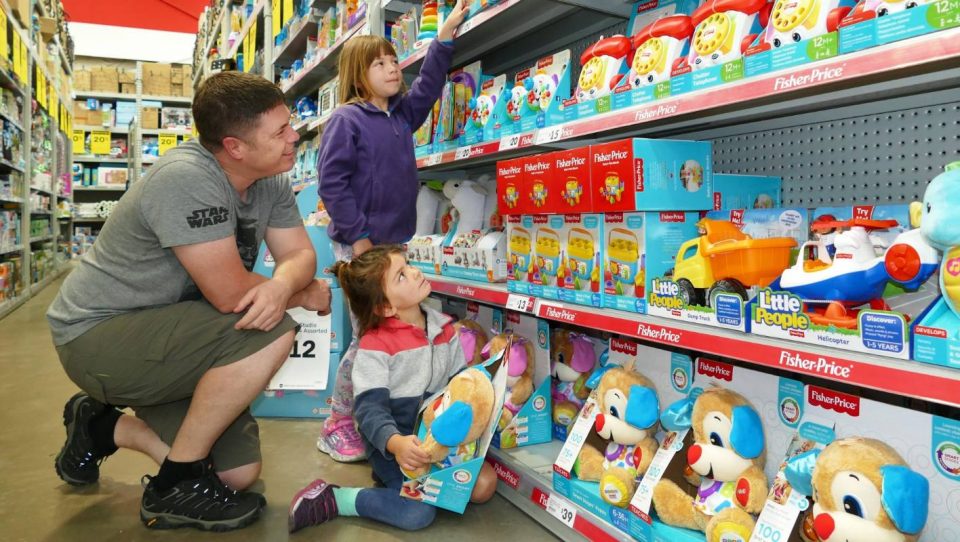The country’s largest retailer says it is “absolutely” prepared to drop suppliers if they don’t cut back on their carbon emissions.
It is nearly a year since The Warehouse Group went “carbon neutral” – that is, it has completely offset its carbon footprint by cutting back on its own emissions, tree planting and buying carbon credits.
In the last year, the company has managed to reduce its overall emissions by 4 per cent.
JOHN HAWKINS/STUFF
The Warehouse has been working on its suppliers to reduce the amount of packaging they use.
But the retailer has hit a stubborn spot with its suppliers and others outside the Warehouse’s direct control. Those emissions rose 16 per cent, compared to 2015, its baseline year.
READ MORE:
* The Warehouse says it’s now carbon neutral, but it’s not perfect on plastic and packaging
* Behind the desk: The Warehouse chief executive officer Nick Grayston
David Benattar, the company’s chief sustainability officer, said the bulk of those emissions stemmed from the suppliers’ choice of sea freight.
Would the Warehouse be prepared to drop suppliers on the issue? “Absolutely,” he said.
The shipping industry’s world body, the International Maritime Organisation, is proposing some aggressive goals to shrink its carbon dioxide footprint by at least 40 per cent by 2030.
Shippers were waking up to the fact that “the emissions they generate by shipping our products is under our responsibility”.
Carbon neutrality is not the Warehouse Group’s ultimate goal. It wants to slash its carbon emissions by 32 per cent by 2030 compared to its 2015 levels.
And its 2019 carbon audit shows its strategy is having some effect. Emissions it does have a direct effect on, like fuel and electricity use, have dropped 9 per cent. Some of it was achieved simply swapping out its light for LED bulbs.
The company has also switched to electric for its light vehicle fleet and hopes to include the rest in a couple of years.
Twenty-four of its stores now also have electric vehicle charging stations, with plans for more.
GETTY IMAGES
Climate change activists march at a climate change mass protest in Madrid last month. Activists from all over the world were trying to influence the COP25 climate change conference.
But perhaps one of the group’s biggest achievements – a group which includes The Warehouse, Warehouse Stationery, Noel Leeming and Torpedo7 – has been its waste reduction.
It redirected 80 per cent of its waste from landfill last year. Waste is “the other side of climate change, they really are combined together, you cannot separate them,” Benattar says.
Another area of high public interest is its packaging. As well as joining the soft plastic recycling scheme, the company has been upping its use of recycled materials and pressuring manufacturers to review their packaging.
Plastic bags are being turned into foam exercise rollers, polystyrene into picture frames, and other waste plastic is being turned into store fixtures.
On the shelf, shoppers might find bedsheets being sold in fabric bags, and corrugated paper instead of bubble wrap.
And where the Warehouse cannot reduce its carbon, it is offsetting it by investing in schemes to cut emissions elsewhere, such as providing solar cookers into communities like India and China, where many of its products are made.
CATHERINE HARRIS/STUFF
The Warehouse Group’s chief sustainability officer David Benattar says going carbon neutral is complex, but also an opportunity.
Benattar has been particularly inspired by a trip to Madrid in December to attend the influential COP25 climate change policy gathering in Spain.
He attended along with The Warehouse Group chief executive Nick Grayston and watched as half a million people marched the city’s streets demanding action.
“You had all the governments there, and a bunch of businesses, and civil society and leaders from every walk of life. You had people like Greta [Thunberg], you had activists, so you had very intense moments.”
As a result, Benattar said the company now felt a responsibility to share what it had learnt.
Buying supplies from sustainably-minded businesses was a start, he said.
Antonio Guterres said effect of rising temperatures is already being felt around the world.
Another was not being afraid to call in experts, so a business’ goals are measurable and “grounded in science”.
The support of business networks, such as the Climate Leaders Coalition which The Warehouse co-founded, could also be a great help, he said.
Taking your staff on the journey was also key, Benattar said. At The Warehouse, staff were encouraged to see the climate in everything they did.
“I’m humbled by the level of focus and commitment that our team members have on this topic.”
GETTY IMAGES
Swedish environment activist Greta Thunberg addresses the COP25 Climate Conference in Madrid last month.
French-born Benattar came to The Warehouse Group from the United States, where he had been working to help companies reduce their footprint for many years.
He was particularly encouraged by The Warehouse founder Stephen Tindall, who he describes as a “father figure,” and the company culture. “It’s one of the most progressive organisations I’ve seen in my career.”
The complexities of going carbon neutral were great, he said, but also “an exciting opportunity”.
“Our Government has done a beautiful job to really progress legislation around the decarbonisation of our economy, and setting a net zero goal for 2050.”
However, with most of the country’s energy coming from renewable sources on one hand, and some “hard to abate” areas of greenhouse gases on the other, New Zealand’s success was heavily reliant on international co-operation.
“It’s not New Zealand itself, it’s the world itself, it’s not The Warehouse Group in itself, it’s coalition and partnership and collaboration to transition to that new decarbonised economy.”
SUPPLIED
Pacific countries hoped to pressure industrialised nations at COP25 into taking bold steps to address the climate crisis. However, negotiators postponed a key decision on how to regulate global carbon markets.


